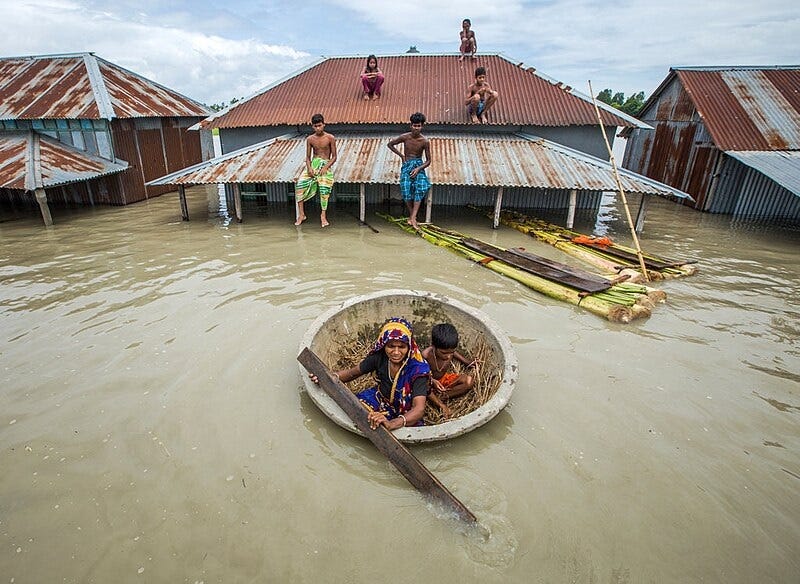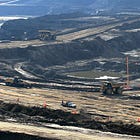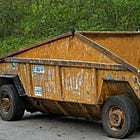Killing USAID Will *Also* Hurt People Affected By Climate Change. Convenient Twofer!
Turns out Americans DO care about foreign aid, so there's that.

We’ll start with the good news, since we all need it: Among the nationwide protests against Donald Trump and Elon Musk’s attempt to dismantle the federal government, thousands of protesters showed up outside the Capitol in Washington DC Wednesday specifically to protest the weekend’s near-erasure of the US Agency for International Development (USAID). They were joined by former USAID officials and Democratic lawmakers in calling for the agency to be reopened, so that vital food and medical aid can keep saving lives abroad.
As Rachel Maddow said on MSNBC last night, if Trump and Musk thought that it would be easy to eliminate USAID first because Americans don’t care about foreign aid, they were very wrong.
In addition to the humanitarian disaster that’s unfolding because of the closure, and the geopolitical fallout as China generously (with some strings attached) offers to replace American assistance to fill the vacuum, the attack on USAID will also make it much harder for the developing world to reach its climate goals. Beyond food and medical help, the agency has been the chief US conduit for helping poor nations develop sustainably, helping them build renewable energy resources, mitigate the effects of climate change, and protect endangered ecosystems like rainforests and wetlands that sequester carbon and keep it out of the atmosphere.
Joe Biden Helped Countries Grow Cleanly. Can’t Have That.
Those efforts expanded significantly during the Biden administration; USAID considered climate a central part of its mission, because if you’re planning to help countries with food and medicine, you have consider how their needs will be affected by droughts, how growing seasons are changing, how to help mitigate the harm of extreme weather events, all of it. The Washington Post’s story (gift link) on the agency’s now-uprooted climate efforts leads with just one vivid example of how USAID made a difference in a climate disaster:
In 2023, a Category 4 cyclone barreled down on the coast near Myanmar and Bangladesh.
But before it made landfall, a warning system — built in part with funding from the U.S. Agency for International Development — sent out alerts and information about shelters. Thousands of people, including those at the world’s largest refugee camp, scrambled to safety. The ultimate death toll — 145 — was much smaller than those from previous cyclones. USAID officials had been planning to replicate the warning system in numerous other countries in the crosshairs of intensifying storms and floods.
But we know how that story ended last weekend.
Among other things that USAID won’t continue doing now: building village-level solar and storage microgrids and training local people to maintain them and go into business building more. Helping farmers in drought-prone areas choose crops that will survive to harvest and build the soil. (We highlighted a similar project in a recent climate roundup, though we don’t think USAID was part of it.) Paying residents near rainforests not to log them. And much much more.
Not surprisingly, one of the alleged sins for which USAID had to die was that in helping countries develop sustainably, the agency supposedly hurt our poor misunderstood friends in the fossil fuel industry, which will suffer if it can’t pollute ever-expanding parts of the world with toxic filth.
One fossil fool with the Heritage Foundation, Max Primorac, wrote Project 2025’s chapter on USAID and whined in testimony to Congress that since the US government isn’t funding oil and gas projects, that has “undercut foreign aid’s objective of reducing poverty,” because villages are so much better off with pipeline explosions than solar microgrids. Primorac also claimed, nonsensically, that promoting clean energy in developing nations is “literally financing China’s global expansion,” although in reality, nations building clean energy projects are less likely to want a Chinese coal plant.
Less Pollution Over There Is Good For America, You Dopes
Gillian Caldwell, the former chief climate officer for USAID under Biden, told Grist that TrumpMusk’s VERY ILLEGAL halt to international climate aid amounts to “taking a torch to development programs that the American people have paid for.” Caldwell added, “Many commitments under the Paris Agreement are funding-contingent, and that’s very much in peril.” But that appears to have been part of the plan, never mind that this was all spending authorized by Congress.
Caldwell oversaw sweeping reforms at USAID that were meant to help orient all the agency’s efforts toward taking climate into account, including a review of virtually all the aid for any given country, to make sure progress wouldn’t be wiped out by the effects of climate change.
For example, the agency would ensure water and sewer systems could handle bigger floods, or would plan to inoculate against diseases that might spread faster in warm weather. The effort was especially important in sectors like agriculture, which is both emissions-heavy and extremely vulnerable to the weather shocks that come with even small climatic shifts.
The positive effects of USAID’s climate programs went far beyond its own budget for climate spending, which was about $600 million in 2023. (That’s around the cost of six F-15 fighter planes and spare parts.) The agency’s work, like so much climate spending, has also leveraged billions of dollars in additional investment from the private sector, especially renewable energy companies and even insurance companies that provide drought and flood coverage.
A bit of good-ish news, too: A lot of USAID’s renewable-energy development aid is likely to keep providing benefits after Trump pulled the plug, because it’s up and running already.
USAID has helped several countries design and hold renewable energy auctions, wherein private companies bid for the right to build new power facilities at low prices. These auctions save countries money and make it easier for them to attract private capital. In the Philippines, two USAID-sponsored auctions generated almost $7 billion in investment to build 5.4 gigawatts of solar and wind energy, enough to power millions of homes — without further USAID support.
But programs like land conservation, protecting carbon sinks like rainforests from being logged, burned, and converted to grazing cattle, will just stop, as will many projects aimed at increasing disaster resilience, like projects in Zimbabwe that help farmers adopt practices that make their land less vulnerable to drought and flooding.
One of the largest disaster relief programs in Zimbabwe, a broad-based initiative to help smallholder farmers, has increased water stability for tens of thousands of households by helping them build small rain catchment systems and restore degraded soils. USAID has been funding the project to the tune of about $12 million annually since 2020, and the program was slated to continue for the next three years.
The Hardnosed Kissingeresque Case For Clean Development
And of course there’s the whole realpolitik national-interest stuff that’s been a key factor in American aid since JFK created USAID back in the 1960s: Countries that are getting American assistance are less likely to become clients of our adversaries.
Rick Duke, a former U.S. deputy climate envoy, said that rather than playing into China’s hands, USAID was countering China’s Belt and Road infrastructure and investment program. He mentioned a program in India, launched in 2023, that was aimed at helping cities build up their fleet of electric buses — manufactured in India, instead of in China.
Nonetheless, Project 2025 claimed that by infusing “radical climate policy” and an “anti-fossil fuel agenda” into its aid strategy, USAID was actually nothing more than a pawn of malevolent forces that want to hurt America and its benevolent extractive and polluting industries. The document even scoffed at the idea that climate change is a bad thing, saying “The aid industry claims that climate change causes poverty, which is false,” which is pretty rich, though not as rich as the funders of Project 2025.
For American progress on climate to matter, the rest of the world needs to decarbonize, and projections by the World Bank and from the Rockefeller Foundation show that poor nations will benefit far more from renewable energy development than from fossil fuels. Renewable energy could create as many as 30 times the jobs in Asia and Africa as oil and gas development, and would get more people connected to electricity sooner. Plus, there’s the whole “keeping the planet habitable” thing, not that the Heritage Foundation, Trump, or Musk consider it important.
Even if foreign aid for food and medical care is restored, there’s little chance that Trump and a Republican Congress will renew any of USAID’s climate programs, and that has serious repercussions for all of our futures. Even if Democrats retake Congress in 2026, they won’t have the majority needed to override a veto, so the soonest America could realistically begin rebuilding what’s being wrecked this week would be after 2028, assuming we’re still doing anything like democracy by then. In the meantime, maybe we can find some of our own billionaires to fund overseas climate help. Former New York Mayor Michael Bloomberg has already stepped up to replace the US share of the UN’s climate funding. We bet there are other billionaires who’d like to save the planet, too.
[Grist / WaPo (gift link) / Photo: Oregon State University / Moniruzzaman Sazal. Creative Commons License 2.0]
Yr Wonkette is funded entirely by reader donations. If you can, please become a paid subscriber, or if a one-time donation is better for you, then it’s better for us, too!







I’ll never get over that the world’s richest man is trying to kill a program designed to help the world’s poorest. And largely because they said something (factual!) that hurt his little feelings. Toxic masculinity and greed will kill us all.
Pour one out for Rosie, the Battle Chonk, who crossed the rainbow bridge this morning peacefully on her favorite, warm blanket. She had a good run. No tears, please.